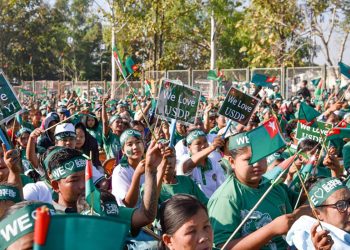Myanmar’s de facto leader Daw Aung San Suu Kyi—once internationally feted as a human rights champion—arrived with her delegation in The Hague, Netherlands on Sunday. This time, her trip is not for diplomatic, ceremonial or business purposes, but to face the International Court of Justice (ICJ). The Republic of The Gambia, on behalf of the Organization of Islamic Cooperation (OIC), has submitted a lawsuit that invokes the 1948 Convention for the Punishment and Prevention of Genocide.
Daw Aung San Suu Kyi can never have imagined she would have to face the ICJ. She started her political struggle in 1988 leading student protests against the Ne Win regime. In 1991 her status as a democratic and human rights champion was affirmed when she won the Nobel Peace Prize. So defending her country against charges of genocide before the World Court is a kind of personal “Black Swan” event, as some theorists refer to events that are largely unforeseen or unpredicted but which go on to shape history.
Daw Aung San Suu Kyi’s stated political aspiration is to build a democratic country where individual and human rights are fully protected, political tolerance is upheld and even international laws are respected.
This political vision has been espoused by her legions of ardent supporters, including the remnants of the “8888” uprising, political activists, former political prisoners, ordinary citizens and even ethnic minorities who have yearned for justice, equality and peace for many decades.
That is why Daw Aung San Suu Kyi and her party, the National League for Democracy (NLD), were swept to power in the 2015 general election. Her election campaign slogan, “Time for Change”, echoed across the country and even the international community. Daw Aung San Suu Kyi’s main promises were to amend the 2008 Constitution, end the country’s armed conflicts and revive the economy.
Three and a half years later, none of those promises has been kept, and Daw Aung San Suu Kyi is struggling to realize her vision. Instead, she has become bogged down in tit-for-tat fighting with the military over amending the Constitution. Achieving peace seems a forlorn hope, as the peace process is deadlocked despite her efforts to resolve the nation’s ethnic conflicts by initiating the 21st-Century Panglong Peace Conference. Gains in economic prosperity have been disproportionally distributed among the elites. The goal of building a federal Union is a long way from being achieved; even the devolution of powers from Naypyitaw to the states has not happened.
Furthermore, freedom of the press, assembly and expression have actually declined, with many journalists and political activists arrested and imprisoned.
And even as she grapples with these lingering domestic challenges and the resultant criticism, international pressure has mounted on the Nobel Peace laureate. Many of the awards given to Daw Aung San Suu Kyi by the international community have been revoked, and the ICJ lawsuit has damaged her credibility; even the Myanmar military seems spooked by the World Court case.
Sadly, while she may be personally blameless as far as accusations of genocide go, the choice she made—to maintain silence over the human rights violations against ethnic minorities and Rohingya—is now shackling her. The trip to The Hague will be her last chance to restore her international stature, either by mounting an effective defense or admitting that crimes have been committed and cooperating with the international community.
Indeed, only time will tell whether Daw Aung San Suu Kyi can endure this tumultuous period and survive such a “Black Swan” event.
Joe Kumbun is the pseudonym of an analyst based in Kachin State.
You may also like these stories:
Rallies Draw Thousands Nationwide in Support of State Counselor’s Defense of Myanmar at ICJ
Myanmar State Counselor Arrives in Netherlands to Lead Rohingya Genocide Defense

















